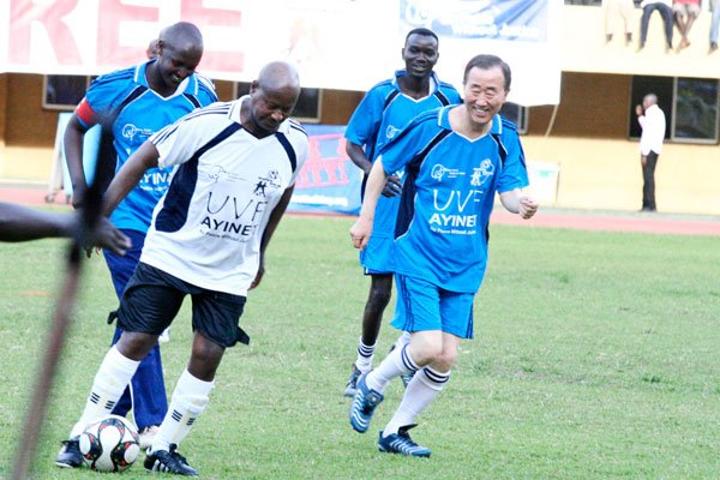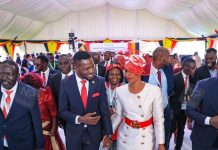Africa-Press – Uganda. In his heyday, in the late 70s former Cranes striker Jimmy Muguwa was revered as the Jackal for his predatory instinct in front of the goal.
But when he hang those magical boots, in 1987, he tried his luck at coaching.
But a tragic accident in 2002 left him with a physical and mental limp, and cost his coaching job at Express FC. After retiring into oblivion and poverty, Muguwa, attributes his suffering to the club’s failure to pay what it owes him. Out of desperation, the member of the historic squad that reached the continental finals in Ghana in 1978, ended up washing dishes at Nakivubo Stadium, where he used to work up crowds as an active footballer.
Yet Muguwa’s story is not an exception. It is the norm. And ahead of the 2016 presidential elections, the NRM government sought to reduce such stories by promising a pension scheme for nationally acclaimed athletes.
However, this remained on paper, otherwise, had it been implemented, most likely Muguwa would have been one of the first beneficiaries.But this is not the only important manifesto proposal that was never implemented.No affirmative policyAccording to a midterm review of the 2016-2021 NRM manifesto published by June 2019, the government failed to develop a policy of affirmative action for persons talented in sports.
The report further acknowledges the lack of an adequate national rewards scheme for excelling national athletes; bursaries and scholarships for elite athletes are no longer forthcoming. (as per the report, the Public University Admission Scheme for the excelling secondary students benefits only 40 students per year on the sports ticket).Aggrey Ashaba, KCCA FC vice chair, says all these are achievable and can help a great deal to lift sports to the desirable status.
He adds that some are being implemented, but there needs to be a policy that emphasises consistency.Ashaba says the monthly Shs1 million each Uganda Cranes star receives from government needs to be improved from a presidential token to a policy that cuts across all sports disciplines.
Vicky Byarugaba and Godfrey Nyakana are some of the boxing graduates from schools. The better story is that they may not be rich but they live decent lives, probably because of education. But many potential talents, mostly from the ghettos, resort to underhand means of survival because boxing in Uganda is a poorly rewarding sport yet they too, like Muguwa, lack an education.
To make matters worse, traditional boxing schools like Namasagali College and Namilyango banned boxing. And the new ones followed suit, no wonder most boxers are school dropouts.Sport, Ashaba says, is largely a poor man’s avenue to escape the shackles of poverty, hence the need for a strong and transparent bursary scheme.
“So by offering those bursaries you are giving them an education and enhancing their chances to drive themselves and their families out of poverty,” the sports enthusiast says, adding that this makes them role models who inspire others to join and dedicate themselves to sports.“By creating a clear path to success [through education and sport] you are reducing the chances of those who resort to the underhand methods of survival.”
Ashaba cites the USA system, where only children from school can be drafted into sports franchises. He says a policy that emphases and facilitates education and sports concurrently is a win-win.“Even if a child does not excel in sports, he or she can be useful with an education. And if he or she excels in sports, the education helps them avoid slumping back into poverty.”
Unclear reward system
Last year, Museveni ordered the sports ministry, through the National Council of Sports to compile a list of athletes (active and retired) who will receive monetary rewards.Ashaba says the criteria of selection should be clear as to who is eligible, how much the reward is and for how long?
Another important, but unfulfilled promise that the government carried forward into the current manifesto is providing incentives for private sector investment in sports.“Investors in other sectors, like hotels, get tax holidays to boost the sectors. Sports investors badly need that enticement too,” Ashaba says.“Why do you tax people who bring in kits and equipment to help a sector that’s not yet reached a profit-making level?”
But why has the government failed to implement such good proposals? “Because sport has not moved its value to where policy decisions are made,” Ashaba says. “Sports leadership should furnish the decision-makers with the relevant information about sport, lobby and pressurise them consistently,”He adds that sports did not have many people who could comfortably pitch for sports, like on the floor of parliament, but slowly that is changing.






